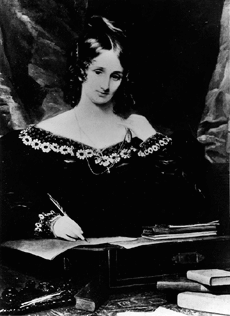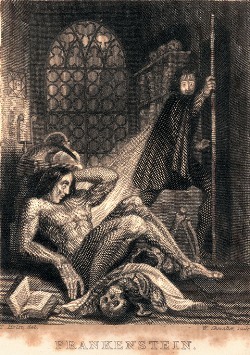With a publication date of 1818, Frankenstein predates the efforts of Jules Verne as the first English-language novel possessing many qualities which would be called “scientific romance” and later “science fiction.” The emphasis here (like its very loose 1931 film adaptation) should be on the word romance because a fan of hard SF probably wouldn’t find much recognizable. The specific science of this fiction is hardly explored at all. While there is a narrative excuse given for this, as a science fiction writer, Mary Shelley probably fits in closer with Alfred Bester and Ray Bradbury than she does with Arthur C. Clarke or Isaac Asimov. Just as we don’t know why Bradbury’s rockets fly, we similarly don’t know the exact procedure and apparatus which gave Shelley’s creature life. No lightning bolts, neck bolts, or giant levers here!
Instead, for the contemporary, uninitiated reader, Frankenstein would appear to have more in common with a pop literary mash-up, like Pride and Prejudice and Zombies. In fact, if I were to describe Frankenstein the novel with such a lens I’d assert that it’s a mash-up between Wuthering Heights and the film version of Frankenstein!
Like Wuthering Heights, the body of Frankenstein’s prose is made up of a series of letters and different narrators which create multiple framing mechanisms. At first, one might wonder just what kind of novel they are reading, as the initial sections make it seem like you’re getting a nautical story about poor Captain Walton sending letters to his sister Margaret. (Did Margaret ever get these letters? Should the reader imagine themselves as Margaret?) Eventually, we realize this seafaring meta-narrator is in the story to stumble across Victor Frankenstein at the North Pole. Frankenstein is a crazed and broken man, trapped, along with Captain Walton’s ship, in the ice. Though the reader doesn’t know it, they’re joining Frankenstein at the end of his journey, and after a few more sections he decides to reveal his tale to Captain Walton.
Through this conceit Mary Shelley is able to dodge telling us about how Victor Frankenstein’s technology specifically works. Captain Walton is a self-described layman (though his writing resembles that of the brilliant Mary Shelley!) and so Frankenstein might be dumbing it down for Walton to understand. But there’s a moral imperative here, too, as Frankenstein has an aside where he tells Walton that he can’t tell him the secret of the life-giving technology! Here’s the exact passage:
I see by your eagerness and the wonder and hope which your eyes express, my friend, that you expect to be informed of the secret with which I am acquainted; that cannot be; listen patiently until the end of my story, and you will easily perceive why I am reserved upon that subject.
This strikes me as one of the only times in the novel where there is a deft aside to the reader that might be interpreted as a claim for calling the book a straight-up cautionary tale. Frankenstein is frequently cited as the ultimate example of a “don’t screw with nature” story, and yet, in my opinion, very little of this heavy-handedness really comes across in prose. Indeed, an introduction by the author (in some versions) seems to make great pains to say that this is simply a story and the applications of these technologies might be good or might be bad, and that the author really has no opinions on the ethical implications either way. Here’s Shelley’s introduction:
The opinions which naturally spring from the character and situation of the hero are by no means to be conceived as existing always in my own conviction, nor is any inference justly to be drawn from the following pages as prejudicing any philosophical doctrine of whatever kind.
 Shelley’s telling us here to get over it and that what you’re about to read is just a crazy yarn. It almost feels like she’s a time traveler, aware of the far-reaching implications of her novel, and trying to downplay them. In almost direct contradiction to this statement Shelley’s alternate title for Frankenstein is The Modern Prometheus, which certainly casts doubts on where she ethically stood on the whole idea of humans literally having the power to create life and death. Further, there is a strong implication in the prose that the reason Frankenstein was able to make these discoveries is because he wasn’t a specialist. Instead, Victor started cross-applying multiple scientific and philosophical schools of thought, and ended up creating a monster. Though the notion that the creature is “patchwork” is touched upon, the basic philosophies which created him are also a mishmash of sensibilities. Did Shelley think it was a good thing to think like this? Did she approve in mixing philosophical viewpoints in all cases?
Shelley’s telling us here to get over it and that what you’re about to read is just a crazy yarn. It almost feels like she’s a time traveler, aware of the far-reaching implications of her novel, and trying to downplay them. In almost direct contradiction to this statement Shelley’s alternate title for Frankenstein is The Modern Prometheus, which certainly casts doubts on where she ethically stood on the whole idea of humans literally having the power to create life and death. Further, there is a strong implication in the prose that the reason Frankenstein was able to make these discoveries is because he wasn’t a specialist. Instead, Victor started cross-applying multiple scientific and philosophical schools of thought, and ended up creating a monster. Though the notion that the creature is “patchwork” is touched upon, the basic philosophies which created him are also a mishmash of sensibilities. Did Shelley think it was a good thing to think like this? Did she approve in mixing philosophical viewpoints in all cases?
My guess is she wasn’t too sure. A pop novelist like James Patterson who writes of serial killers certainly doesn’t condone the act of serial killing, and yet he sort of needs those events to construct his novels. It’s possible Shelley’s situation was similar, she needed mad Victor Frankenstein and his creature, and then she wasn’t sure how to explain their existence to polite company.
One explanation is the infamous “bet” which seems to have spawned the creation of this novel. According to the preface and several other accounts, Mary Shelley, Percy Shelley, Lord Byron, and John Polidori were all sitting around and decided to challenge each other to write stories predicated upon some kind of “supernatural occurrence.” According to Shelley, she is the only one who actually delivered on this bet. It’s certainly a nice thought, and as a writer/editor friend of my pointed out to me recently in talking about Shelley; it’s amazing the kinds of things that are produced when writers sit around and talk.
Like the technology Victor Frankenstein gives to his creature, I feel it necessary to conceal the majority of the plot from the reader of this column. It is so starkly different from the various film versions, that some of the revelations are worth experiencing for yourself. One major spoiler: the creature speaks, frequently. This probably is my favorite thing about the novel. Why have a character created by supernatural means, without giving him or her the ability to speak? I think the reason aliens speak in so many good science fiction novels is because the monster speaks in the novel Frankenstein. I think the reason aliens DON’T speak in so many bad science fiction movies is because of the film Frankenstein.
Will Frankenstein become your favorite book overnight? Probably not. The prose is highly compelling, but I’m not sure the character of Victor Frankenstein himself is all that convincing. (I actually quite like the creature!) But what Frankenstein will do is shock you by how original it is considering everything that has come after it. Shelley might have been the mother of science fiction, and maybe even unwittingly created the subgenre of biopunk, but with Frankenstein she didn’t create a monster, but instead opened up a whole lot of possibilities for the rest of us. I think the best way to thank her is to read her.
Ryan Britt is the staff writer for Tor.com. He’s a born lever-puller.










